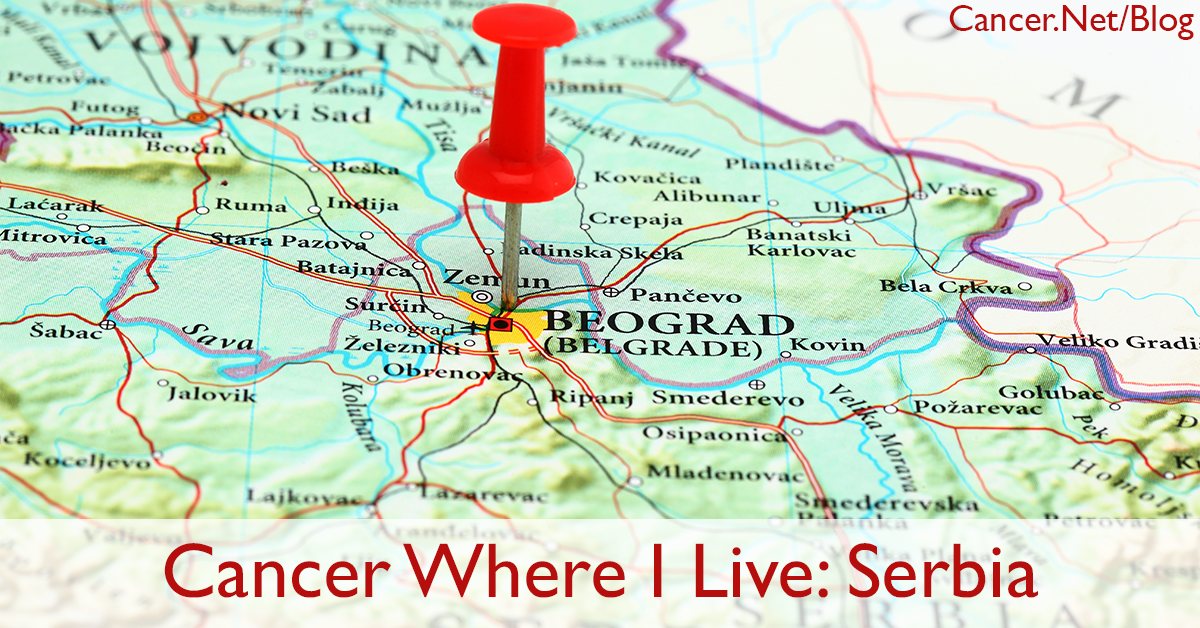
Cancer in My Community is a Cancer.Net Blog series that shows the global impact of cancer and how people work to care for those with cancer in their region. Snežana Bošnjak, MD, PhD, is the head of the Department for Supportive Oncology/Palliative Care at the Institute for Oncology and Radiology of Serbia, a National Cancer Centre, in Belgrade, Serbia. She was selected to be a faculty member for the College of the European School of Oncology (ESCO) as well as the European Society for Medical Oncology (ESMO) for supportive, or palliative, care. Dr. Bošnjak was also appointed to be a part of the International Education Steering Group at the American Society of Clinical Oncology (ASCO). View Dr. Bošnjak’s disclosures.
Why I care for people with cancer
People with cancer can face many different cancer-related symptoms and side effects related to cancer treatment. They can also experience a range of psychological, social, existential, and spiritual challenges. Together with anti-cancer treatments, such as chemotherapy or radiation therapy, people with cancer also need patient-directed supportive care. Supportive care provides interventions to help relieve the symptoms of cancer, prevent side effects from its treatment, and help people cope with the disease during all stages of cancer, including survivorship.
My interest in supportive care started when I recognized the unfulfilled needs of people with cancer in getting the help and support they require throughout their diagnosis, treatment, and beyond. When I started working, oncology was mostly focused on treating the disease itself, almost as if the person with cancer was just an invisible carrier of the tumor. Today, it is clear that cancer care should include approaches that focus on the tumor as well as the whole patient. The integration of these 2 approaches leads to better, more patient-centered care, and it improves many clinical outcomes in oncology: the patient’s quality of life, relief of symptoms, and survival.
My mission has been to foster the integration of supportive care into mainstream cancer care and establish a formal supportive oncology and palliative care service at the Institute for Oncology and Radiology of Serbia (IORS), a National Cancer Centre, in Belgrade, Serbia. The IORS has been accredited as a European Society for Medical Oncology (ESMO) Designated Center of Integrated Oncology and Palliative Care. We have 2 patient-centered departments integrated into the clinical structure of the IORS that recognize and respond to physical, psychological, social, existential, nutritional, and informational needs of people with cancer and their caregivers from the time of diagnosis and through all stages of the disease. Through these services, we offer whole-patient cancer care that addresses tumor treatment, supportive care, and psychosocial support. I hope to see this kind of service expanded across all oncology practices in Serbia.
What cancer is like in Serbia
Cancer is the second leading cause of death in Serbia. In comparison with other European countries, the incidence rate of cancer is close to the European average, but the death rate is currently the highest in Europe.
Lung cancer is the most common type of cancer in my country with the highest incidence and death rate. Despite the fact that Serbia has 3 national screening programs for breast cancer, cervical cancer, and colorectal cancer, a significant number of people are still diagnosed with an advanced stage of these diseases, and the death rate from these cancers is still high and among the highest in Europe.
This data shows how important it is to develop a patient-directed approach to care in addition to the disease-directed one in Serbia. It is important to screen, assess, and respond to the varying needs of people with cancer and their caregivers throughout the cancer experience. Fortunately, supportive care and palliative care are included in the Serbian National Cancer Control Plan. The right to relieve pain and suffering is recognized in the law on patients’ rights.
Where people with cancer can find local resources and support in Serbia
The Serbian Society for the Fight Against Cancer, established in 1927, is the largest organization in Serbia to support people with cancer, and it became a member of the International Union Against Cancer (UICC) in 1967. Their official journal addresses educational and informational needs of people with cancer. In addition, people with cancer can find translated guidelines about cancer prevention, diagnosis, treatment, supportive care, and pain treatment as well as psychosocial support at the IORS official website.
In 2007, the Working Group for Patient Support (WG) was established at IORS, which included representatives from patient associations and the experts from the IORS. The role of WG is to establish continuous communication between the IORS and patient associations; provide adequate information on cancer, cancer treatment, and cancer services; improve services at the IORS; facilitate communication between associations and other organizations; and advocate for the public recognition and rights of people with cancer.
Associations to help people with cancer in Serbia started to develop in the 1990s. Some of them are childhood cancer (or parents’) associations, including Always With Children, Zvončica,
Čika Boca, and MladiCe. Others are focused on helping people with specific types of cancer, including breast cancer (Europa Donna Serbia, Jefimija, Let’s Be Together, Milica), gynecological cancer (Speak), digestive cancers (Association of Colon and Liver Cancer Patients), stoma (ILCO Serbia), lymphoma (LIPA Lymphoma Patient Association), lung cancer (With Full Lungs), rare tumors (UPRT), melanoma (Association of Melanoma Patients), and people who have received a laryngectomy (Association of Laryngectomized Patients of Serbia).
Finally, the National Association of Cancer Treated Patients (NALOR) aims to help people with cancer in Serbia across all different disease types.




